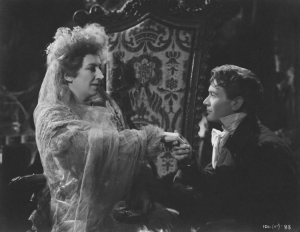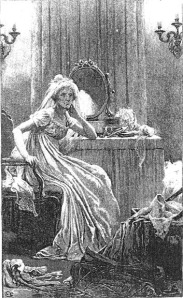 Ever since I saw David Lean’s film version of Great Expectations on TV as a kid, I have been fascinated by the character of Miss Havisham who, having been jilted on the morning of her wedding, has stopped all the clocks and lives on for years in her wedding dress, one shoe on, cake rotting on the table amidst the cobwebs of her rotting mansion.
Ever since I saw David Lean’s film version of Great Expectations on TV as a kid, I have been fascinated by the character of Miss Havisham who, having been jilted on the morning of her wedding, has stopped all the clocks and lives on for years in her wedding dress, one shoe on, cake rotting on the table amidst the cobwebs of her rotting mansion.
Inspiration for Norma Desmond in one of my favorite American films, Sunset Boulevard, Miss Havisham embodies not just heartbreak but Post Traumatic Stress Disorder. When we think about PTSD we tend to think about violent events, particularly war experiences, but the mechanics of PTSD are that overwhelming emotional experience causes a person to mentally leave the building of their body for a time (think of that slow motion, floaty feeling just before the impact of a car accident).
 As a result, the surreal self cannot fully process the trauma, and it is left to float like so many cobwebs throughout the body, never making it to be properly filed in the brain’s true memory storage area. Since the trauma is loose in the body, it can be triggered by sounds, smells or sights and suddenly loom up as if it were happening in real time, rather like a pop-up window unexpectedly opening on a computer screen.
As a result, the surreal self cannot fully process the trauma, and it is left to float like so many cobwebs throughout the body, never making it to be properly filed in the brain’s true memory storage area. Since the trauma is loose in the body, it can be triggered by sounds, smells or sights and suddenly loom up as if it were happening in real time, rather like a pop-up window unexpectedly opening on a computer screen.
For these reasons, an important aspect of treating Post Traumatic Stress Disorder involves the traumatized person telling their story, often repeatedly, until it can be properly stored as memory and no longer intrude at wanton moments.
In Great Expectations, Miss Havisham adopts a daughter and trains her to be a heart breaker, eventually herself succumbing to burn wounds after her wedding dress catches fire. I believe that we all have an inner Miss Havisham—the part of us that has been jilted, hurt, humiliated, rejected and tasted dirt in return for our sincere love; the chief offenders tend to be parents, siblings, lovers and once-trusted friends, yet we humans can be incredibly resistant to forgive those who have deeply hurt us.
 Perhaps one reason we cling to our anger, and end up stuck in time (often stuck somewhere in childhood, even if we do not Gothically dress the macabre part) is that we unconsciously hope for the return of the lost loved one as well as their love… the very love we consciously negate (i.e. the revisionist view of the awful parent who we believe is all bad and who never loved us, as well as the idea that we never loved them).
Perhaps one reason we cling to our anger, and end up stuck in time (often stuck somewhere in childhood, even if we do not Gothically dress the macabre part) is that we unconsciously hope for the return of the lost loved one as well as their love… the very love we consciously negate (i.e. the revisionist view of the awful parent who we believe is all bad and who never loved us, as well as the idea that we never loved them).
Much as tears are meant to bring the mommy to us when we are helpless babies, our sorrowful displays are often unconsciously meant to attract the consciously devalued love-object.
Thus, as 2009 finds itself in its end of life final hours, this is a good time to put any Havisham aspects of this year, as well as years gone by, on the couch and talk through whatever traumas still haunt us and/or block us from being free, happy and our best Selves. Talk to a friend about this, talk to a shrink, post it as a comment if that feels useful or write about it in a private journal. Anything you can do to help explain to yourself why you feel wounded, not necessarily excusing those who have hurt us by unconsciousness or by malice, but forgiving for the sake of ourselves. And if you’re not yet sure you are worthy of good things (owing to the wounds to self-esteem that often come along with trauma), heal for the good of your children (see “If mama’s not happy nobody’s happy”: http://tiny.cc/Ybltr).  Whether or not revenge is a dish best served cold, living well is often our best revenge (and letting go of anger frees us to love and live well).
Whether or not revenge is a dish best served cold, living well is often our best revenge (and letting go of anger frees us to love and live well).
So, let’s dedicate today to being conscious of our traumas, to working them through and healing—in the service of our own kids and all our collective children.
Namaste, Bruce



{ 2 comments… read them below or add one }
My inner Miss Haversham seemed to be gone during my achievement-filled twenties and thirties, but I have gradually come to see that some long-past events still need further processing. This post made me feel less alone. Thank you.
After reading this post I became aware of many things. Both my parents had traumatic losses in their families that paralyzed them in many ways, which may have even led to their relationship. Consequently, I’ve been predisposed to the same “Miss Havisham” paralysis, perhaps because it connects me emotionally to my parents. Also, Great Expectations along with Oliver Twist have been my favorite Dickens books, perhaps because I not only felt familiar with Miss Havisham’s response to loss, but also because I’ve always identified with the abandoned child in Pip and Oliver. What’s interesting to me as I think about this in light of Great Expectations is that it was an escaped criminal who provided love and caregiving to Pip. Lots to think about. Thank you Bruce.